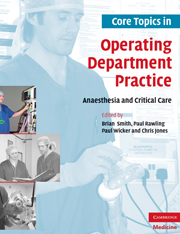Book contents
- Frontmatter
- Contents
- Acknowledgements
- List of Contributors
- Foreword
- Preface
- 1 Introduction: anaesthetic practice. Past and present
- 2 Risk assessment
- 3 ECG monitoring in the recovery area
- 4 The use of cricoid pressure during anaesthesia
- 5 Anaesthetic breathing circuits
- 6 Deflating the endotracheal tube pilot cuff
- 7 How aware are you? Inadvertent awareness under anaesthesia
- 8 Aspects of perioperative neuroscience practice
- 9 Resuscitation
- 10 Intravenous induction versus inhalation induction for general anaesthesia in paediatrics
- 11 Managing difficult intubations
- 12 Obstetric anaesthesia
- 13 Understanding blood gases
- 14 Total intravenous anaesthesia
- 15 Anaesthesia and electro-convulsive therapy
- 16 Mechanical ventilation of the patient
- 17 Perioperative myocardial infarction
- 18 Developing a portfolio
- 19 Accountability in perioperative practice
- Index
- References
19 - Accountability in perioperative practice
Published online by Cambridge University Press: 13 August 2009
- Frontmatter
- Contents
- Acknowledgements
- List of Contributors
- Foreword
- Preface
- 1 Introduction: anaesthetic practice. Past and present
- 2 Risk assessment
- 3 ECG monitoring in the recovery area
- 4 The use of cricoid pressure during anaesthesia
- 5 Anaesthetic breathing circuits
- 6 Deflating the endotracheal tube pilot cuff
- 7 How aware are you? Inadvertent awareness under anaesthesia
- 8 Aspects of perioperative neuroscience practice
- 9 Resuscitation
- 10 Intravenous induction versus inhalation induction for general anaesthesia in paediatrics
- 11 Managing difficult intubations
- 12 Obstetric anaesthesia
- 13 Understanding blood gases
- 14 Total intravenous anaesthesia
- 15 Anaesthesia and electro-convulsive therapy
- 16 Mechanical ventilation of the patient
- 17 Perioperative myocardial infarction
- 18 Developing a portfolio
- 19 Accountability in perioperative practice
- Index
- References
Summary
Key learning points
Recognising the importance of accountability
Legal, professional and employment areas of accountability
Accountability in anaesthetic practice
Towards a consensus – recognising the importance of accountability
Patients often see life beyond the operating room door as a mysterious, closed world, viewed only occasionally and with fear. This situation has undoubtedly arisen because of patients' anxiety surrounding surgery and their lack of understanding about what will happen to them once inside the perioperative environment. They are also just as likely to be unaware of who is caring for them, let alone be able to understand the various roles of nurses and operating department practitioners (ODPs) behind the masks.
Anaesthetic practitioners in particular have debated accountability to improve patient care. Sometimes, the real purpose of the discussion may have been for less altruistic reasons, for example to absolve themselves of their responsibilities, or perhaps for one of the professional groups to try to assert a professional dominance. The recent media experiences involving the medical profession (Shipman, Alderhey and Bristol inquiries) would suggest the public are becoming more interested in seeking redress when their care falls below the standard that they expect. It seems unavoidable that growth in medico-legal litigation and the corresponding litigious culture should extend to other healthcare professions and into all aspects of healthcare practice, including the previously closed world of the operating department.
An accountability matrix
In seeking to show areas of accountability, it is important to understand something of the legal frameworks that exist.
- Type
- Chapter
- Information
- Core Topics in Operating Department PracticeAnaesthesia and Critical Care, pp. 191 - 200Publisher: Cambridge University PressPrint publication year: 2007



